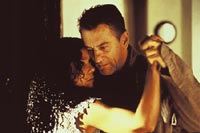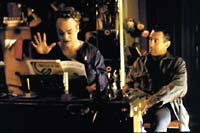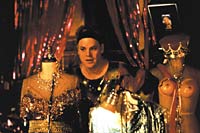
A perfect name for a perfect film. What else could you expect? Mary, don't ask or I'll
break your face. Yes, the gritty world of N.Y. drag queens and local whores meets
up the revenge-seeking heavy-fisted drug dealers when a big boss gets robbed by
one of his needy, seedy, greedy dealers. The big boys leave no stone (or stick of
furniture) unturned in an attempt to retrieve the hidden stash of stolen cash. A retired
policeman living across the airshaft from much of this madness hears trouble afoot
and tries to offer assistance, but, as gunfire leads to murder and fate takes a terrible
turn, this ex-cop winds up in need of assistance himself.
©MGM, a Tribeca production
photos: A-film distribution, Holland

|
For years preceding this chain of events, however, Walt Koontz (Robert De Niro)
passes his uneventful retirement to the best of his abilities in a shoddy tenement
house on the Lower East Side of New York City. Once having been awarded a
medal for shooting two bank robbers and saving several hostages in the act, his life
now consists of the few simple joys left to him. Generally greeted by residents during
the daytime who regard him as a hero, he dances his evenings away at the nearby
tango palace, usually ending the night in the rapturous arms of an attractive lady.
Nowadays, however, it would seem the ladies, like his girlfriend Karin (Wanda de
Jesus), are usually more interested in his money than his looks. The one exception
to the rule is the smitten Tia (Daphne Rubin-Vega) whom he ignores for all the wrong
reasons.
His domestic peace is often disturbed by a group of drag queens rehearsing their
latest revues, accompanied by the lively piano tunes of his red-wigged neighbor,
Rusty Zimmerman (Philip Seymour Hoffman). Privately, the fifty-something ex-
marine Koontz tries to hold the pieces of his life together whereas the out-spoken,
street-wise Rusty, in parallel fashion, watches his (her?) life falling apart. Rusty
frequently finds solace in identifying with various film goddesses. On one occasion,
returning from drowning his sorrows in alcohol after his mother's funeral, Rusty
reinforces himself with thoughts of Lana Turner in "Ziegfeld Girl." This Manhattan
homestead often resembles a melting pot stewing with losers and lost illusions. Both
main characters manage to survive by disguising their individual tragedies.
©MGM, a Tribeca production
photos: A-film distribution, Holland

|
The meeting between conservative Koontz and outrageous Rusty finds their worlds
colliding until fate joins them together in an odd and unexpected mutual respect.
Their initial dislike for each other stems from clich-ridden concepts. Both have had
their share of hard times and both have "seen it all." At first sight, they seem
tremendously different from each other, but the similarities grow more obvious with
time. When the ex-cop has a stroke (affecting both movement and speech), he is
confronted with a predicament that he dwells on until it becomes unbearable. After
receiving some sympathetic assistance and reassurance from his doctor (Madhur
Jaffrey) as well as some practical advice from his masseur, he slowly becomes
convinced that rehabilitation is not a total impossibility. The masseur, among other
things, points out that "red hot phone sex" is an eventual outlet to be positively
explored alongside increasing speech improvement. Nevertheless, the shame his
masculinity feels keeps him confined to quarters until he decides to approach his
"undesirable" neighbor for assistance with song lessons and finally begins the
rehabilitation of his speech.
This is a place in the city where America's least-wanted mingle with New York's
finest, where the disillusioned meet the disgusted, and where dissin' finally forces out
a primal scream; a place where all things can happen. Where one can say, "I'm a
singer. I'm a female impersonator. I'm an artist" as well as saying, "I'm not an artist.
I'm not a female impersonator. I'm ugly and I'm a drag queen. And I'm ugly." And,
finally, a place where sympathies can give a crippled tango partner hope that he
might one-day dance again.
De Niro gives the sublime kind of performance everyone has become accustomed to.
He spent time at the Rusk Institute of NYU Medical Center observing stroke victims in
order to research this role. Several mouthpieces were made for him to create the
paralyzed face at different stages. Director Shumacher explains that "he designed a
lead shoe and certain weights for his arm which are painful to wear, but which helped
him with the accuracy of the stroke." Hoffman, who as already proven his abilities in
such notable films as "Boogie Nights" and "The Talented Mr. Ripley" reaches
superstardom with his role in this movie. Always perfection in his portrayals, he
manages to give the outrageous Rusty a sensitive and subtle interpretation. (Go for
it!) He did his research at the drag clubs of New York, assisted by some of the actual
drag queens seen in the movie.
Writer/director Joel Schumacher has found an absolutely appropriate niche for his
talents with this movie. His sometimes hyperactive and overproduced vehicles are
tapered this time around into a fascinating story with explosive intensity and
captivating characters. Once he came up with the idea for this story, he kept notes
during a four year period that he shaped into a script over a three week period and
the final result has the strength we have seen in earlier films like "Falling Down",
"Dying Young", and "The Client."
©MGM, a Tribeca production
photos: A-film distribution, Holland

|
Production designer Jan Roelfs, a native of Amsterdam, has masterfully recreated
the atmosphere of the dingier and dirtier side of New York City. Long known for his
fantastic creations in the world of filmmaking, it is equally exciting to see his work
encompassing the grittier world as well. Much of the interior shooting was done on
sets (which could easily be confused for the real thing) because of the amount of time
it would have cost otherwise to shoot in a real location. Roelfs succeeds in making
us feel like we're really there.
"Start shoutin'the news." Believe it or not, this is an uproarious comedy (with, as you
can well understand, some obviously heavy notes underscoring it).
© 1994-2006 The Green Hartnett
|

